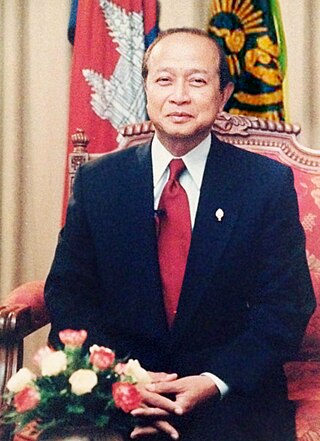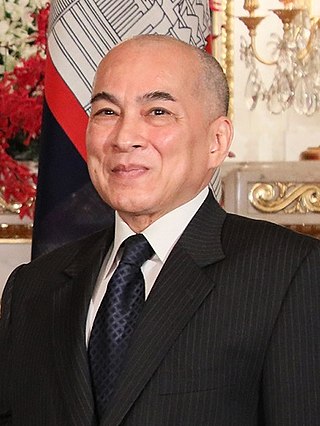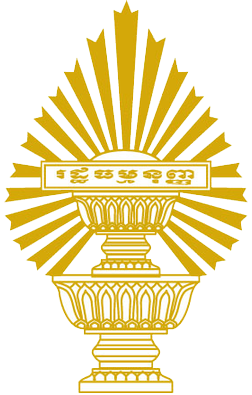Related Research Articles
The politics of Cambodia are defined within the framework of a constitutional monarchy, in which the king serves as the head of state, and the prime minister is the head of government. The collapse of communism set in motion events that led to the withdrawal of the Vietnamese armed forces, which had established their presence in the country since the fall of the Khmer Rouge. The 1993 constitution, which is currently in force, was promulgated as a result of the 1991 Paris Peace Agreements, followed by elections organized under the aegis of the United Nations Transitional Authority in Cambodia. The constitution declares Cambodia to be an "independent, sovereign, peaceful, permanently neutral and non-aligned country." The constitution also proclaims a liberal, multiparty democracy in which powers are devolved to the executive, the judiciary and the legislature. However, there is no effective opposition to the Prime Minister Hun Sen, who had been in power from 1984 until 2023. His Cambodian People's Party won all 125 seats in the National Assembly in 2018 after the banning of opposition party CNRP and KNLF. KNLF became a main opposition exiled in Denmark after CNRP was dissolved. During the communal election in 2022 and the national election in 2023, there were no international observers. The government is considered to be autocratic.

Norodom Sihanouk was a member of the Cambodian royal house who led the country as King and Prime Minister. In Cambodia, he is known as Samdech Euv. During his lifetime, Cambodia was under various regimes, from French colonial rule, a Japanese puppet state (1945), an independent kingdom (1953–1970), a military republic (1970–1975), the Khmer Rouge regime (1975–1979), a Vietnamese-backed communist regime (1979–1989), a transitional communist regime (1989–1993) to eventually another kingdom.

Cambodia, officially the Kingdom of Cambodia, is a country in Mainland Southeast Asia. It borders Thailand to the northwest, Laos to the north, Vietnam to the east, and has a coastline along the Gulf of Thailand in the southwest. It spans an area of 181,035 square kilometres, and has a population of about 17 million. Its capital and most populous city is Phnom Penh.

Samdech Hun Sen is a Cambodian politician, and former army general who currently serves as the president of the Senate. He previously served as the prime minister of Cambodia from 1985 to 1993 and from 1998 to 2023. Hun Sen is the longest-serving head of government in Cambodia's history. He is the president of the Cambodian People's Party (CPP), which has governed Cambodia since 1979, and has served as a member of the Senate since 2024. His full honorary title is Samdech Akka Moha Sena Padei Techo Hun Sen.

The National United Front for an Independent, Neutral, Peaceful and Cooperative Cambodia, commonly referred to as FUNCINPEC, is a royalist political party in Cambodia. Founded in 1981 by Norodom Sihanouk, it began as a resistance movement against the People's Republic of Kampuchea (PRK) government. In 1982, it formed a resistance pact with the Coalition Government of Democratic Kampuchea (CGDK), together with the Khmer People's National Liberation Front (KPNLF) and the Khmer Rouge. It became a political party in 1992.

The Cambodian People's Party (CPP) is a Cambodian political party which has ruled the country since 1979. Founded in 1951, it was originally known as the Kampuchean People's Revolutionary Party (KPRP).

Kratié, alternatively spelled Kracheh, is a province of Cambodia located in the northeast. It borders Stung Treng to the north, Mondulkiri to the east, Kampong Thom and Kampong Cham to the west, and Tboung Khmum, and the country of Vietnam to the south.

The Candlelight Party is a liberal party in Cambodia. The party was a member of the Council of Asian Liberals and Democrats, Liberal International, and the Alliance of Democrats. It is the largest opposition party in Cambodia, and the main challenger to the ruling Cambodian People's Party. The party, which would have been the only competitive opposition party to the CPP, was disqualified from running in the 2023 election by the National Election Committee despite previously being permitted to participate in the 2022 local elections. The party resumed political activity in October 2021 after having been inactive since 2012.

Norodom Ranariddh was a Cambodian politician and law academic. He was the second son of King Norodom Sihanouk of Cambodia and a half-brother of King Norodom Sihamoni. Ranariddh was the president of FUNCINPEC, a Cambodian royalist party. He was also the first Prime Minister of Cambodia following the restoration of the monarchy, serving between 1993 and 1997, and subsequently as the President of the National Assembly between 1998 and 2006.

Norodom Sihamoni is King of Cambodia. He became King on 14 October 2004, a week after the abdication of his father, Norodom Sihanouk.
Cambodia is a one-party dominant state with the Cambodian People's Party in power. Cambodia's legislature is chosen through a national election. The general election is held every five years in the fourth Sunday of July. The Parliament of Cambodia has two chambers. The National Assembly has 125 members, each elected for a five-year term by proportional representation. The Senate has 62 members, mostly indirectly elected.

The Parliament is the bicameral legislature of Cambodia consisting of the Senate and the National Assembly. The parliament is composed of 187 members, 125 MPs and 62 senators.

General elections were held in Cambodia on 27 July 2008. The result was a victory for the ruling Cambodian People's Party, which won 90 of the 123 seats.
Ta Veaeng is a district located in Ratanakiri Province, in north-east Cambodia. It is the northernmost district in Cambodia, protruding between Laos and Vietnam.

Tea Banh is a Cambodian politician and general. He was a Deputy Prime Minister and Minister for National Defence of Cambodia from 1987 until 2023. He is a former general and a member of the Cambodian People's Party and was elected to represent Siem Reap Province in the National Assembly of Cambodia in the 2003 elections. He was succeeded as defence minister by his eldest son Tea Seiha.

The Khmer Anti-Poverty Party is a Cambodian political party founded in September 2007. Its leader is Cambodian-American Daran Kravanh.
Ou Chum is a commune in Ou Chum District in north-east Cambodia. It contains eight villages and had a population of 3,090 in 1998. In the 2007 commune council elections, all five seats went to members of the Cambodian People's Party. The NGO Forum on Cambodia reported in 2006 that the land alienation rate in Ou Chum was high.

The 1997 Cambodian coup d'état took place in Cambodia from July to September 1997. As a result, co-premier Hun Sen ousted the other co-premier Norodom Ranariddh. At least 32 people were killed during the coup.

General elections were held in Cambodia between 23 and 28 May 1993. The result was a hung parliament with the FUNCINPEC Party being the largest party with 58 seats. Voter turnout was 89.56%. The elections were conducted by the United Nations Transitional Authority in Cambodia (UNTAC), which also maintained peacekeeping troops in Cambodia throughout the election and the period after it.

General elections were held in Cambodia on 28 July 2013. The National Election Committee (NEC) announced that some 9.67 million Cambodians were eligible to cast their ballots to elect the 123-seat National Assembly. Voter turnout was reported to be 69.6%, a record low for a general election. Polling precincts opened 7:00 a.m. and closed at 3:00 p.m. The Cambodian Minister of Information, Khieu Kanharith announced in preliminary results that the Cambodian People's Party won 68 seats and the opposition Cambodia National Rescue Party won all the remaining 55 seats. This election marked the largest seat loss by the Cambodian People's Party to date, and their lowest share of seats since 1998.
References
- ↑ "Election results" Archived 2008-06-16 at the Wayback Machine . Cambodia National Election Committee. Accessed June 18, 2008.